RBSE Class 11 Maths Important Questions Chapter 8 Binomial Theorem
Rajasthan Board RBSE Class 11 Maths Important Questions Chapter 8 Binomial Theorem Questions and Answers.
Rajasthan Board RBSE Solutions for Class 11 Maths in Hindi Medium & English Medium are part of RBSE Solutions for Class 11. Students can also read RBSE Class 11 Maths Important Questions for exam preparation. Students can also go through RBSE Class 11 Maths Notes to understand and remember the concepts easily.
RBSE Class 11 Maths Chapter 8 Important Questions Binomial Theorem
Question 1.
If in expansion of (1 + x)2n, coefficient of (p + 1)th term is equal to coefficient of (p + 3)th term, then show that P = n - 1.
Answer:
In the expansion of (1 + x)2n
(p + 1)th term = 2nCp xp
and (p + 3)th term = [(p + 2) + 1]th term
= 2nCp + 2 xp + 2
We have,
Coefficient of (p + 1)th term = coefficient of (p + 3)th term
Thus, 2nCp = 2nCp + 2
or p + p + 2 = 2n
(∵nCx ⇒ nCy = x + y = n)
Thus, 2p = (2n - 1)
or 2 p = 2(n - 1)
p = n - 1
Hence Proved

Question 2.
Prove that in the expansion of (1 + x)n + 1, coefficient of (r + 1)th term is equal to sum of coefficients of rth and (r + 1)th term in the expansion (1 + x)n.
Answer:
In the expansion of (1 + x)n + 1 (r + 1)th term = n + 1Cr xr
Again, coefficient of rth term in expansion of (1 + x)n = nCr - 1 and coefficient of (r + 1)th term = nCr
Thus,
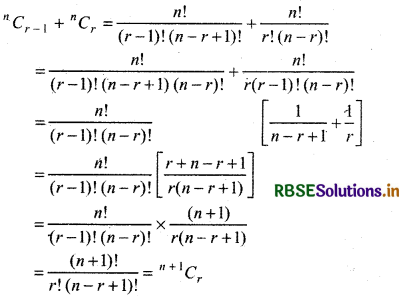
Thus in expansion of (1 + x)n + 1, coeff. of (r + 1)th term = Coeff. of rth term + Coeff. of (r + 1)th term in expansion of (1 + x)n.
Hence Proved.
Question 3.
Prove that in the expansion of (1 + x)n coefficient of equidistant terms from two ends are equal.
Answer:
In the expansion of (1 + x)n, we have to show that
Coeff.of (r + 1)th term from start = Coeff. of (r + 1)th term from last
In the expansions of (1 + x)n
Coeff, of (r + 1)th term from start = nCr
and Coeff. of (r + 1)th term from end
= Coeff. of [(n + 1) - (r + 1) + 1]th term from start
= Coeff. of [n + 1 - r - 1 + 1]th term
= Coeff. of [n - r + 1]th term
= nCn - r
Since nCr = nCn - r
Thus, coefficient of equidistant terms from two ends are equal.
Hence Proved

Question 4.
In the expansion of (x + a)2n, find middle term.
Answer:
In the expansion of (x + a)2n no. of terms = 2n + 1 (odd)
Thus, one middle term, \(\frac{1}{2}\) [(2n + 1) + 1]th term
= (n + 1)th term
Now, middle term of expansion = (n + 1)th term
= 2nCn x2n - n an
= 2nCn xn an
Question 5.
Evaluate 1 + 25C1 + 25C2 + 25C3 + ....... + 25C25.
Answer:
(1 + x)n = nC0 + nC1 x + nC2 x2 + nC3 x3 + .... nCn xn
Putting x = 1
(1 + 1)n = nC0 + nC1 + nC2 + nC3 + ........ nCn
or 2n = nC0 + nC1 + nC2 + nC3 + ........... nCn
Here, putting n = 25
225 = 25C0 + 25C1 + 25C2 + 25C3 + .... 25C25
= 225
Question 6.
If in the expansion of (1 + x)n binomial coefficient are C0, C1, C2, ........, Cn, then prove that C0 + 2C1 + 3C2 + ......... + (n + 1)Cn = (n + 2)2n - 1
Answer:
L.H.S.
= C0 + 2C1 + 3C2 + ......... + (n + 1)Cn
= C0 + (C1 + C1) + (C2 + 2C2) + (C3 + 3C3) + ........... (Cn + nCn)
= (C0 + C1 + C2 + C3 + ...... + Cn) + (C1 + 2C2 + 3C2 + ........ nCn)
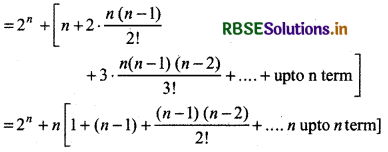
= 2n + n (1 + 1)n - 1 = 2n + n.2n - 1
= (n + 2)2n - 1 = R.H.S.
HenceProved
Note: Here, C0 = nC0, C1 = nC1,C2 = nC2 etc. and nC0 + nC1 +nC2 + nCn = 2n
Sum of coefficients in (1 + x)n is 2n

Question 7.
If (1 - x + x2)4 = 1 + p1x + p2x2 + p3x3 + .......... + p8x8, then prove that P2 + P4 + P6 + P8 = 40
Answer:
(1 - x + x2)4
= [1 - (x - x2)]4 = (1 - y)4, where y = (x - x2)
Expanding by binomial theorem,
(1 - y)2 = 1 - 2C1 y + 4C2 y2 - 4C3 y3 + 4C4 y4
or (1 - x + x2)4 = 1 - 4(x - x2) + 6(x - x2)2 - 4(x - x2)3 +(x - x2)4
Since, 4C0 = 1, 4C1 = 4, 4C2 = 6, 4C3 = 4, 4C4 = 1
or (1 - x + x2)4 = 1 - 4x + 10x2 - 16x3 + 19x4 - 16x5 + 10x6 - 4x7 + x8 ........... (1)
But we have,
(1 - x + x2)4 = 1 + p1x + p2x2 + p3x3 + p6x4 + p5x5 + p6x6 + p7x7 + p8x8 ...................... (2)
Comparing R.H.S. of equations (1) and (2)
p2 = 10, p4 = 19, p6 = 10, p8 = 1
Thus, p2 + p4 + p6 + p8 = 10 + 19 + 10 + 1 = 40
Hence Proved
Question 8.
If in expansion of (1 + x)43 coefficient of (2r + 1)th term and (r + 2)th term are equal, then find the value of r.
Answer:
In expansion of (1 + x)43
Coefficient of (2r + 1)th term = 43C2r and (r + 2)th term
= coefficient of [(r +1) + 1]th term
= 43Cr + 1
We have,
43C2r = 43Cr + 1
Thus, 2r + (r + 1) = 43
or 3r = 42
r = 14
Question 9.
If in expansion of (1 + x)34 coefficient of (r - 5)th and coefficient of (2r - 1)th term are equal then find value of r.
Answer:
In expansion of (1 + x)34 coefficient of (r - 5)th term = 34Cr - 6 and coefficient of (2r - 1)th term = 34C2r - 2
We have, 34Cr - 6 = 34C2r - 2
(∵ nCn = nCy ⇒ n = x + y)
It is possible only when r - 6 + 2r - 2 = 34 or
r - 6 = 34 - (2r - 2)
or r - 6 = 34 - 2r + 2
or 3r = 42
∴ r = 14
∵ r should be natural number, so r = 14

Question 10.
In expansion of \(\left(\frac{2 x}{3}-\frac{3}{x^2}\right)^6\), find term independent of x.
Answer:
Let (r + 1)th term is independent of x
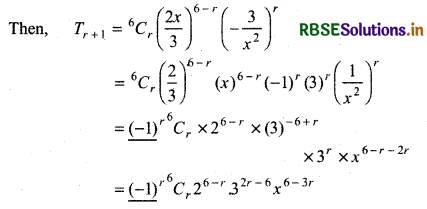
For term independent of x, power of x will be zero.
Thus, 6 - 3r = 0 ⇒ r = 2
Thus, 3rd term is Independent of x
∴ Required term = (- 1)2 6C2 26 - 2 34 - 6 . x0
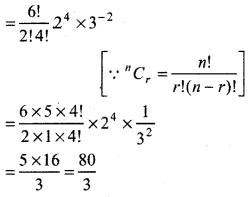
Question 11.
In the expansion of (x - a)n, find rth term from end.
Answer:
In the expansion of (x - a)n, rth term from end is equal to (n - r + 2)th term form beginning.
Thus, (n - r + 2)th term
= T(n - r + 1) + 1 = nC(n - r + 1)xr - 1 (- a)n - r + 1
= nCn - r + 1 (x)r - 1 . (- 1)n - r + 1 a(n - r + 1)
= (- 1)n - r + 1Cn - r + 1 (x)r - 1 a(n - r + 1)
Question 12.
In the expansion of \(\left(\sqrt[5]{x}+\frac{1}{2 \sqrt[5]{x}}\right)^{20}\), x > 0 find term Independent of x.
Answer:
General term of expansion, Tr + 1
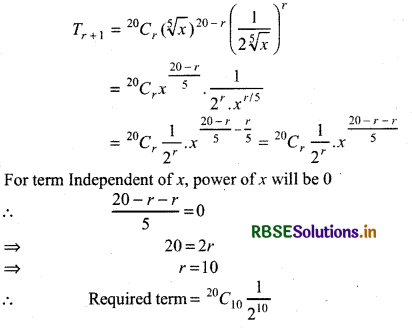

Question 13.
Using binomial thorem find coefficient of a5 in (2 + a)4 (1 - 2a)5.
Answer:
(2 + a)4 = 4C0 24 + 4C1 23 . a + 4C2 22 . a2 + 4C3 2.a3 + 4C4.a4
= 16 + 32a + 24a2 + 8a3 + a4
and (1 - 2a)5 = 5C0(1)5 + 2C1 (1)4 . (- 2a)
+ 5C0 (1)3 (- 2a)2 + 5C3 (1)2 (- 2a)3 + 5C4 1 (- 2a)4 + 5C5 (- 2a)5
= 5C0 - 5C1 (2a) + 5C2 (4a2) - 5C3 8a3 + 5C4 24 a4 - 5C525.a5
= 1 - 10a + 40a2 - 80a3 + 80a4 - 32a5
and
(2 + a)4 (1 - 2a)5 = (16 + 32a + 24a2 + 8a3 + a4)
[1 - 10a + 40a2 - 80a3 + 80a4 - 32a5]
Coefficient of x5
= 16 (- 32) + 32 × 80 + 24 × (- 80) + (8 × 40) - 40
= - 512 + 2560 - 1920 + 320 - 40
= 2880 - 2472
= 408
Question 14.
Find number of terms in
(x + a)100 + (x - a)100.
Answer:
Since,
(x + a)n + (x - a)n = 2[nC0 xn a0 + nC2 xn - 2 a2 + nC4 xn - 4 a4 + ........]
Where n is even number, then
No. of terms in [(x + a)n + (x - a)n] = (\(\frac{n}{2}\) + 1)
here, n = 100
Thus, no. of terms in expansion = (\(\frac{100}{2}\) + 1) = 51
Thus, there will be 51 terms in given expansion.
Question 15.
Prove that:
\(\frac{{ }^n C_r+{ }^n C_{r-1}}{{ }^n C_{r-1}}=\frac{n+1}{r}\)
Answer:
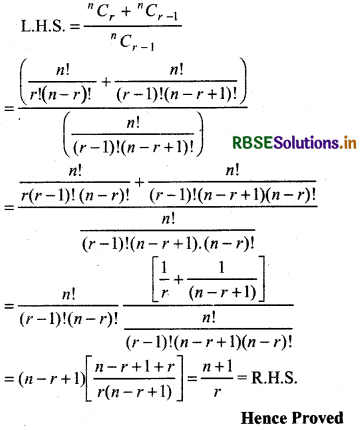

Question 16.
Prove that:
nC0 + 3. nC1 + 5.nC2 + ....... +(2n + 1) nCn = (n + 1)2n.
Answer:
L.H.S. = nC0 + 3. nC1 + 5.nC2 + ....... + (2n + 1) nCn
= nC0 + (2 + 1) nC1 + (4 + 1) nC2 + ........ (2n + 1) nCn
= nC0 + (2. nC1 + nC1) + 4.(nC2 + nC2) + ....... (2n. nCn + nCn)
= 2. nC1 + 4nC2 + 6 nC3 + ........ + 2nnCn + (nC0 + nC1 +nC2 + nC3 + ........ nCn)
= 2[nC1 + 2nC2 + 3. nC3 + ...... + nCn] + (1 + 1)n
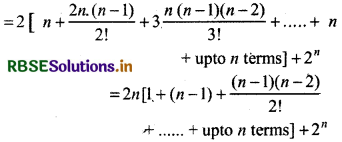
= 2n.(1 + 1)n - 1 + 2n
= 2n.2n - 1 + 2n = n.2n + 2n
= (n + 1)2n
= R.H.S.
Hence Proved.
Question 17.
Prove that:
2nC0 + nC1 + 2.nC2 + nC3 + 2. nC4 + nC5 + ........ = 3.2n - 1
Answer:
L.H.S. = 2nC0 + nC1 + 2.nC2 + nC3 + 2. nC4 + nC5
= 2(nC0 + nC2 + nC4 + ................) + (nC1 + nC3 + nC5 + ...... +)
= 2[nC0 + nC2 + nC4 + .......] + (nC1 + nC3 + nC5 + .........+ )
But nC0 + nC2 + nC4 + ....... + ...... = nC1 + nC3 + nC5 + nC7 + .......
∵ In the expansion of (1 + x)n, sum of coefficient of even terms is equal to sum of coefficient of odd terms.
L.H.S. = 3[nC0 + nC2 + nC3 + nC4 + .......]
= 3.2n - 1 [∵ In expansion of (1 + x)n sum of coefficient is 2n - 1]
= R.H.S.
Hence Proved
Question 18.
Prove that:
nC0 nC1 + nC1 nC2 + nC2 . nC3 + ..................... + nCn - 1 nCn
Answer:
We know that,
(1 + x)n = nC0 + nC1 x + nC2 x2 + ....... + nCn xn ................... (i)
Replacing x by \(\frac{1}{x}\) in equation (i)
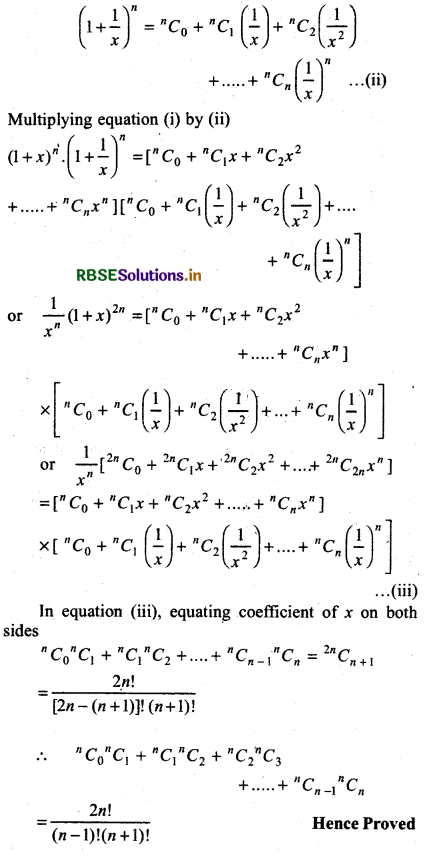

Question 19.
Prove that:
\(\left(\frac{{ }^n C_1}{{ }^n C_3}\right)+2\left(\frac{{ }^n C_3}{{ }^n C_1}\right)+3\left(\frac{{ }^n C_3}{{ }^n C_2}\right)+\ldots+n\left(\frac{{ }^n C_n}{{ }^n C_{n-1}}\right)=\frac{n(n+1)}{2}\)
Answer:
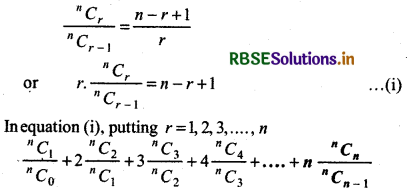
= n + (n - 1) + (n - 2) + (n - 3) + .............. + 1
= \(\frac{n \cdot(n+1)}{2}\)
= R.H.S.
Question 20.
Prove that :
m + nCr = mCr + mCr - 1 nC1 + mCr - 2 nC2 + ................. + nCr
Where r < cm, r < n and m, n and r are positive Integers.
Answer:
∵ (1 + x)m = mC0 + mC1 x + mC2 x2 + mC3 x3 + ....... + mCr xr + ........... + mCnxm
∴ (1 + x)m . (1 + x)n = (1 + x)m + n
= [mC0 + mC1 x + ......... + mCnxm) × (nC0 + nC1 x + .................. + nCmxn)
Comparing coefficient of 'x' in both sides
m + nCr = mCr . nC0 + mCr - 1 nC1 + mCr - 2 nC2 + ......... + mC0 nCr
= m + nCr = mCr + nCr - 1 nCr + mCr - 2 nC2 + ................. + mCr - 1 nCr + nCr
Hence Proved.
Multiple Choice Questions
Question 1.
Value of (1 + √5)4 + (1 - √5)4
(a) 112
(b) 121
(c) 211
(d) None of these
Answer:
(a) 112
Question 2.
In the expansion of (1 - x)10, the 9th term is:
(a) - 120x7
(b) 45x8
(c) 54x7
(d) None of these
Answer:
(b) 45x8

Question 3.
In the expansion of (√x - √7)17 16th term is:
(a) - 136xy15/2
(b) 136x15/2 y15/1
(c) - 136x15/2y
(d) None of these
Answer:
(a) - 136xy15/2
Question 4.
in the expansion of \(\left(\frac{x}{a}-\frac{a}{x}\right)^{2 n}\), then(r + 1)th term is:
(a) (- 1)r 2nCr \(\left(\frac{x}{a}\right)^{2 n-r}\)
(b) (- 1)r 2nCr \(\left(\frac{x}{a}\right)^{2 n-2r}\)
(c) (- 1)r nCr \(\left(\frac{x}{a}\right)^{n-r}\)
(d) None of these
Answer:
(b) (- 1)r 2nCr \(\left(\frac{x}{a}\right)^{2 n-2r}\)
Question 5.
In the expansion of (1 + 3x + 3x2 + x3)20, number of terms is:
(a) 61
(b) 60
(c) 52
(d) None of these
Answer:
(a) 61
Question 6.
In the expansion of \(\left(\frac{4}{5} x-\frac{5}{2 x}\right)^9\), the 9th term is:
(a) 54x8
(b) 45x8
(c) 35x8
(d) None of these
Answer:
(b) 45x8
Question 7.
In the expansion of (3x - \(\frac{1}{2 x}\))16, middle term is:
(a) \(\frac{12870 \times 3^8}{2^8}\)
(b) \(\frac{12870 \times 2^8}{3^8}\)
(c) \(\frac{12807 \times 3^8}{2^8}\)
(d) None of these
Answer:
(a) \(\frac{12870 \times 3^8}{2^8}\)
Question 8.
In the expansion of (1 + 3x + 3x2 + x3)2, middle term is:
(a) 60C30 x30
(b) 60C30 x60
(c) 60C30 x50
(d) None of these
Answer:
(a) 60C30 x30

Question 9.
In the expansion of (1 - \(\frac{1}{x}\))10, middle term is:
(a) - 252
(b) 252
(c) 522
(d) None of these
Answer:
(a) - 252
Question 10.
In the expansion of (1 + x)2n, middle term is:
(a) \(\frac{135 \ldots(2 n-1)}{n !} 2^n \cdot x^n\)
(b) \(\frac{2.46 \cdot \cdots(2 n-2)}{n !} 2^n \cdot x^{2 n}\)
(c) \(\frac{123.4 .5 .+\ldots \ldots(n-1) .^n}{(2 n) !} 2^n\)
(d) None of these
Answer:
(a) \(\frac{135 \ldots(2 n-1)}{n !} 2^n \cdot x^n\)
Question 11.
In the expansion of (1 - 2x3 + 3x5) [1 + \(\left(\frac{1}{x}\right)\)]8 coefficient of x is:
(a) 154
(b) 145
(c) 541
(d) None of these
Answer:
(a) 154
Question 12.
In the expansion of (1 + x + x2 + x3)11 coefficient of x4 is:
(a) 990
(b) 909
(c) 900
(d) None of these
Answer:
(a) 990
Question 13.
In the expansion of (2 - x + 3x2)6 coefficient of x5 is:
(a) - 4692
(b) 4692
(c) 6492
(d) None of these
Answer:
(a) - 4692
Question 14.
In the expansion of (x3 - \(\frac{3}{x^2}\))15 term independent of x is:
(a) 15C9 (- 3)9
(b) 15C9 (3)9
(c) 15C9 (9)9
(d) None of these
Answer:
(a) 15C9 (- 3)9

Question 15.
In the expansion of (1 + x + 2x3) (\(\frac{3}{2}\)x2 - \(\frac{1}{3 x}\))9 term independent of x is:
(a) \(\frac{5}{4}\)
(b) \(\frac{4}{5}\)
(c) \(\frac{5}{8}\)
(d) None of these
Answer:
(a) \(\frac{5}{4}\)
Question 16.
In the expansion of (1 + x + 2x3) (\(\frac{3}{2}\)x2 - \(\frac{1}{3 x}\))9 term independent of x is:
(a) \(\frac{17}{54}\)
(b) \(\frac{54}{17}\)
(c) - \(\frac{17}{54}\)
(d) None of these
Answer:
(a) \(\frac{17}{54}\)
Question 17.
In the expansion of \(\left\{\frac{1}{2} x^{1 / 3}+x^{-1 / 3}\right\}^8\) term independent of x is:
(a) 7
(b) 6
(c) 8
(d) None of these
Answer:
(a) 7
Question 18.
In the expansion of (1 + x)2n coefficient of xn in expansion of (1 + x)2n - 1
(a) Two times
(b) Three times
(c) Four times
(d) None of these
Answer:
(a) Two times
Question 19.
In the expansion of (1 + x)p + q coefficient of xp and xq are:
(a) Equal
(b) Two times of each other
(c) Three times of each other
(d) None of these
Answer:
(a) Equal
Question 20.
If in the expansion of (1 + x)43 coefficient of (2r + 1)th and (r + 2)th terms are equal then value of r is :
(a) 14
(b)41
(c) 42
(d) None of these
Answer:
(a) 14

Question 21
If (1 - x + x2)n = ao + a1x + a2x2 + ....... + a2nx2n then a0 + a2 + a4 + ......... a2n equals to:
(a) \(\frac{3^n+1}{2}\)
(b) \(\frac{3^n-1}{2}\)
(c) \(\frac{2^n+1}{3}\)
(d) None of these
Answer:
(a) \(\frac{3^n+1}{2}\)
Question 22.
In expansion of (1 + x2)5 (1 + x4) coefficient of x5 is:
(a) 60
(b) 30
(c) 90
(d) None of these
Answer:
(a) 60
Question 23.
If in the expansion of (1 + x)2n second, third and fourth terms are in G.P. then
(a) 2n2 - 9n + 7 = 0
(b) 2n2 + 9n + 7 = 0
(c) 2n2 - 9n - 7 = 0
(d) None of these
Answer:
(a) 2n2 - 9n + 7 = 0
Question 24.
If in expansion of (1 + x)18 coefficient of (2r + 4)th and (r - 2)th are equal then value of r:
(a) 6
(b) 12
(c) 18
(d) None of these
Answer:
(a) 6
Question 25.
If in expansion of \(\left(a x^2+\frac{1}{b x}\right)^{11}\) coefficient of x7 is equal to coefficient of x-7 in the expansion of \(\left(a x-\frac{1}{b x^2}\right)^{11}\) then:
(a) ab = 1
(b) ab = - 1
(c) ab = \(\frac{1}{2}\)
(d) None of these
Answer:
(a) ab = 1
Question 26.
If in the expansion of (1 + x)2n, coefficient of (p + 1)th term is equal to coefficient of (p + 3)th term, then p equals to:
(a) n
(b) n - 1
(c) n + 1
(d) None of these
Answer:
(b) n - 1

Question 27.
If in the expansion of \(\left(\sqrt{x}+\frac{1}{3 x^2}\right)^{10}\), rth term is constant then value of r is:
(a) 2
(b) 3
(c) 1
(d) None of these
Answer:
(a) 2
Question 28.
If in the expansion of (1 + x)5, coefficient of (2r + 4)th and(r - 2th terms are equal then value of r is:
(a) 5
(b) 6
(c) 4
(d) None of these
Answer:
(a) 5
Question 29.
Ratio of coefficient of x10 in expansion of (1 - x2)10 and term independent of x in expansion of \(\left(x-\frac{2}{x}\right)^{10}\) is:
(a) 32 : 1
(b) 1 : 32
(c) 2 : 31
(d) None of these
Answer:
(b) 1 : 32
Question 30.
If a and b are respectively coefficient of xm and xn in the expansion of (1 + x)m + n then:
(a) a = b
(b) a = 2b
(c) am = bn
(d) None of these
Answer:
(a) a = b
Question 31.
If a and b are respectively sum of coefficient in the expansion of (1 - 3x + 10x2)n and (1 + x2)n, then relation between a and b is:
(a) a = b3
(b) a = b
(c) a3 = b
(d) None of these
Answer:
(a) a = b3
Question 32.
In the expansion of (1 + x - 3x2)2143, sum of binomial coefficient is:
(a) 1
(b) - 1
(c) 2143
(d) None of these
Answer:
(b) - 1
Question 33.
In the expansion of (1 + x)50, sum of coefficient of odd power terms is:
(a) 249
(b) 250
(c) 251
(d) None of these
Answer:
(a) 249

Question 34.
In the expansion of (ax + \(\frac{1}{x}\))n, if value 0f 4th term is \(\frac{5}{2}\) then value of a and n is:
(a) \(\frac{1}{2}\), 6
(b) 1, 3
(c) \(\frac{1}{2}\), 3
(d) None of these
Answer:
(a) \(\frac{1}{2}\), 6
Question 35.
In the expansion of (1 + x)n, a, b , c, d are respectively 6th, 7th, 8th and 9th terms then \(\frac{b^2-a c}{c^2-b d}\) equals:
(a) \(\frac{4 a}{3 c}\)
(b) \(\frac{3 c}{4 b}\)
(c) \(\frac{3 b}{4 c}\)
(d) None of these
Answer:
(c) \(\frac{3 b}{4 c}\)
Fill in the Blanks
Question 1.
The number of terms In the expansion of (x + y + z)n is ............................ .
Answer:
\(\frac{(n+1)(n+2)}{2}\)
Question 2.
In the expansion of (x2 - \(\frac{1}{x^2}\))16 the value of constant term is ................................. .
Answer:
16C8
Question 3.
The coefficient of a-6b4 in the expansion of \(\left(\frac{1}{a}-\frac{2 b}{3}\right)^{10}\) is ................................... .
Answer:
\(\frac{1120}{27}\)

Question 4.
Middle term in the expansion of (a3 + ba)28 is .................................... .
Answer:
28C14 a56 b14
Question 5.
The ratio of the coefficients of x’ and in the expansion of (1 + x)p + q is .................................. .
Answer:
equal
Question 6.
If 2515 is divided by 13, the remainder is ................................. .
Answer:
12
Question 7.
The largest coefficient of (1 + x)30 is ...........................................
Answer:
30C15
Question 8.
The coefficient of x11 in the expansion of \(\left(x^3-\frac{2}{x^2}\right)^{12}\).
Answer:
- 25344
Question 9.
There are terms are free from radical sign in the expansion of (x1/2 + y1/3)100 ...............................
Answer:
17 terms
Question 10.
The coefficient of am in the expansion of (1 + a)m + n is ..................................
Answer:
\(\frac{(m+n) !}{m ! n !}\)
State which of the statement is true or false in the following questions
Question 1.
The number of terms in the expansion (√2 + 1)6 + (√2 - 1)6 is 5.
Answer:
False
Question 2.
The number of terms in the expansion [(2x + y3)4]7 is 8.
Answer:
False
Question 3.
The value of (1.01)100000 is greater than 100000.
Answer:
True
Question 4.
The coefficient of x6 y3 in the expansion of (x + 2y)9 is 672.
Answer:
True
Question 5.
9n + 1 - 8n - 9 is divisible by 64.
Answer:
True
Question 6.
There are two middle terms in the expansion of \(\left(a x-\frac{x^3}{b}\right)^{16}\).
Answer:
False

Question 7.
Number of terms in the expansion of (a + b)n where n ∈ N is one less than the power n.
Answer:
False
Question 8.
If (1 + ax)n = 1 + 8x + 24x2 + ..................... the value of a + n is 5.
Answer:
False
Question 9.
The fifth term from the end in the expansion of \(\left(\frac{x^3}{2}-\frac{2}{x^2}\right)^9\) is - 252x2.
Answer:
True
Question 10.
There are 4 terms in the expansion of (1 + 2x + x2)3.
Answer:
False

- RBSE Solutions for Class 11 Maths Chapter 3 त्रिकोणमितीय फलन Ex 3.1
- RBSE Solutions for Class 11 Maths Chapter 2 संबंध एवं फलन विविध प्रश्नावली
- RBSE Solutions for Class 11 Maths Chapter 2 संबंध एवं फलन Ex 2.3
- RBSE Solutions for Class 11 Maths Chapter 2 संबंध एवं फलन Ex 2.2
- RBSE Solutions for Class 11 Maths Chapter 2 संबंध एवं फलन Ex 2.1
- RBSE Solutions for Class 11 Maths Chapter 1 समुच्चय विविध प्रश्नावली
- RBSE Solutions for Class 11 Maths Chapter 1 समुच्चय Ex 1.6
- RBSE Solutions for Class 11 Maths Chapter 1 समुच्चय Ex 1.5
- RBSE Solutions for Class 11 Maths Chapter 1 समुच्चय Ex 1.4
- RBSE Solutions for Class 11 Maths Chapter 1 समुच्चय Ex 1.3
- RBSE Solutions for Class 11 Maths Chapter 1 समुच्चय Ex 1.2